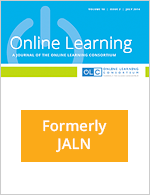Volume 15, Issue 2 - June 2011
From Scarcity to Abundance: IT’s Role in Achieving Quality-Assured Mass Higher Education
To adapt to the knowledge economy The United States needs millions more educated citizens. New approaches to delivering academic quality and quality assurance in teaching and learning make effective, affordable postsecondary education accessible to more learners than ever before possible....
Online Teacher Education: Exploring the Impact of a Reading and Literacy Program on Student Learning
This study presents findings from an investigation of the impact of teachers who graduated from a fully online master’s degree program with training in pedagogy and a content-specialization in elementary reading and literacy (oERL) on reading achievement in a large urban public school system in the northwestern United States. The...
An Exploration of Differences Between Community of Indicators in Low and High Disenrollment Online Courses
Though online enrollments continue to accelerate at a rapid pace, there is significant concern over student retention. With drop rates significantly higher than in face-to-face classes it is imperative that online providers develop an understanding of factors that lead students to disenroll. This study utilizes a data mining approach to...
Using Text Mining to Characterize Online Discussion Facilitation
Facilitating class discussions effectively is a critical yet challenging component of instruction, particularly in online environments where student and faculty interaction is limited. Our goals in this research were to identify facilitation strategies that encourage productive discussion, and to explore text mining techniques that can help discover meaningful patterns in...

